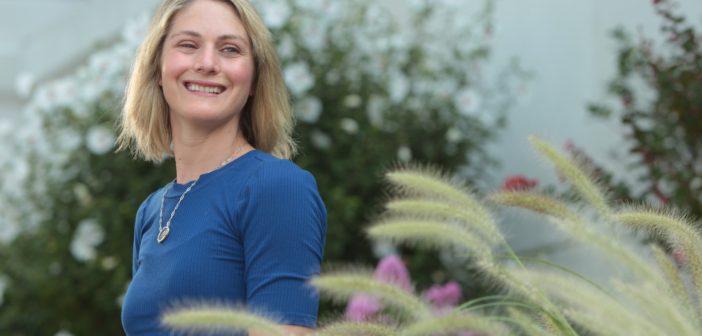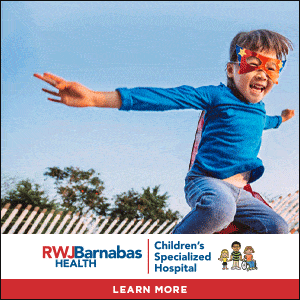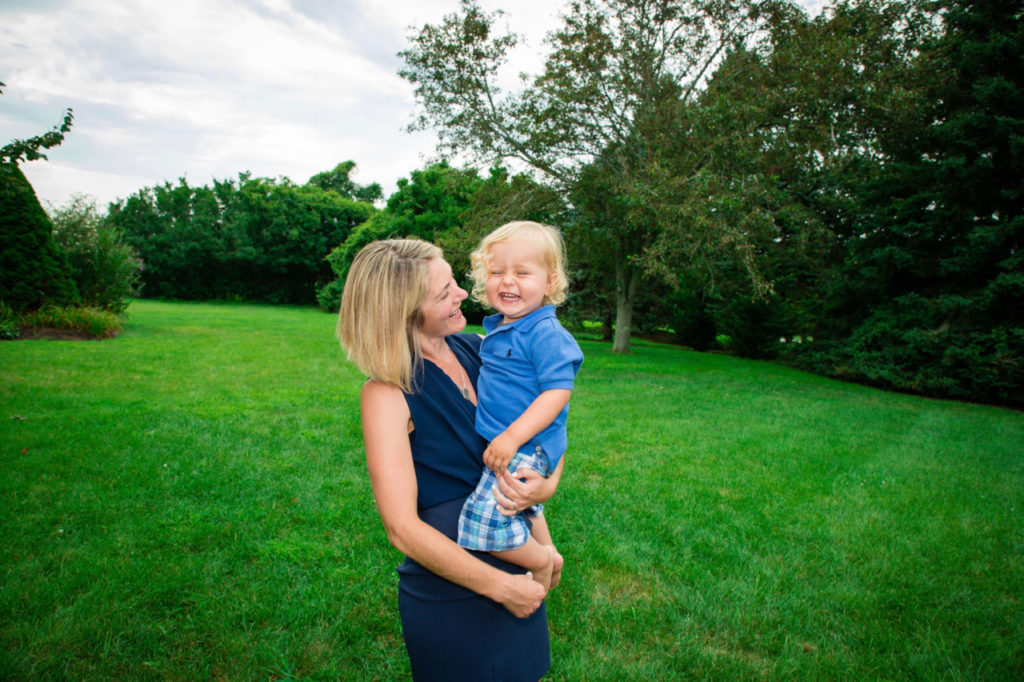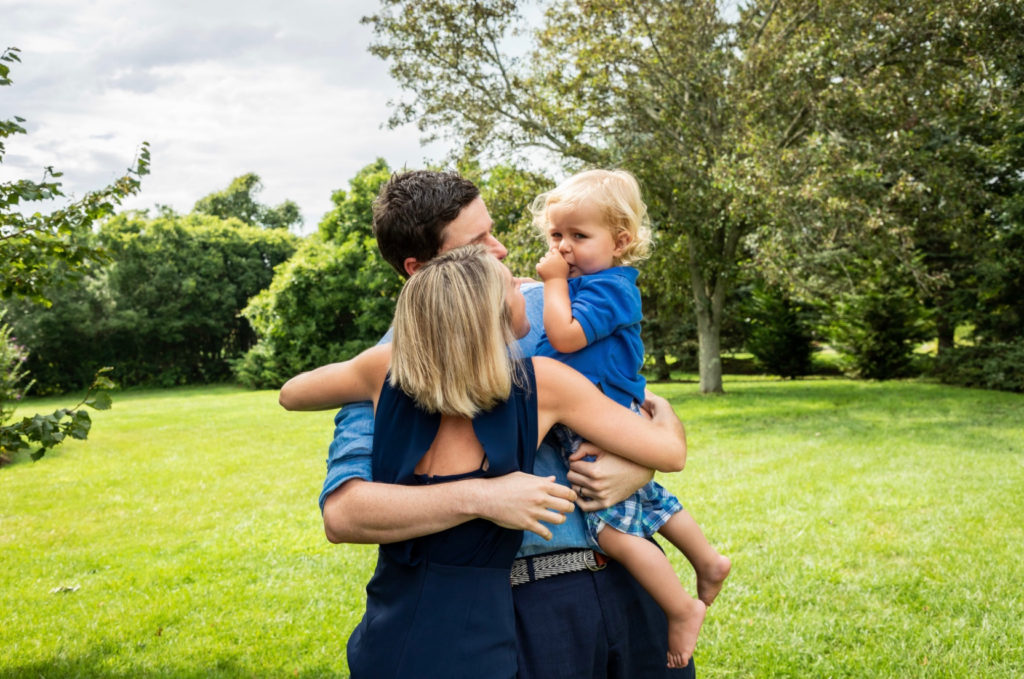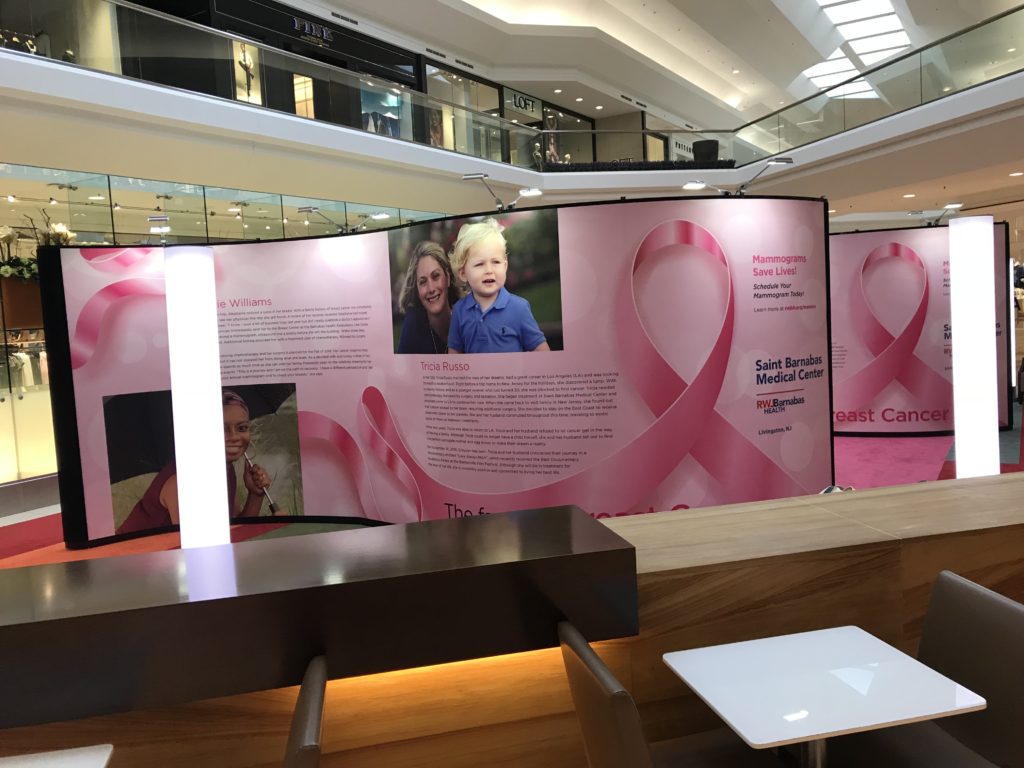For many people, their 30s are a time to welcome new things into their lives like starting a family, getting married, or making strides in their career. Tricia Russo’s 30’s were derailed a bit when she was hit with a double whammy: she was diagnosed with breast cancer and learned that she would not be able to retrieve her eggs to naturally conceive. While she didn’t know what her journey would hold, she learned that sometimes Plan Z is better than Plan A in terms of starting a family. We’re inspired by her strength to fight a terminal illness and her dedication to raising awareness for metastatic breast cancer and infertility. NJMOM sat down with Tricia to learn about how surviving cancer made her grateful for everyday life, and all of her wonderful helpers at Saint Barnabas Medical Center, an RWJBarnabas Health facility, and the Institute for Reproductive Medicine and Science.
Getting the dreaded news
NJMOM: Could you tell me a little bit about your diagnosis story?
Tricia: I was diagnosed with breast cancer in December of 2011. At 30 years old, I discovered a lump in my breast. I was so young, so I was given a mammogram and a biopsy and then the call you never want to get – ‘you have breast cancer.’ At the time, I was living in LA while working at Walt Disney Motion Pictures trying to carve out a career for myself. I got this news on December 19th, six days before Christmas. The doctor said it was so aggressive that I shouldn’t wait for treatment. My first chemo treatment was on December 22, 2011, and my whole family was at Saint Barnabas Medical Center in Livingston, NJ. They all went into the infusion room with me for my first chemo treatment and they brought board games to play while I got treatment. This is something I’ll never forget.
I went through chemo first to shrink the tumor, then a single mastectomy and radiation. That whole process was a year, but that was just the beginning. I thought I was cancer free after that, but then a few months later I was having excruciating headaches. Dr. Leitner discovered I had a 3cm tumor in my brain, which is still considered breast cancer, called metastatic cancer. I had brain surgery and brain radiation and that was the only thing I needed to treat the brain. I’m on treatment now for the rest of my life. Metastatic breast cancer is currently incurable, and it’s why I fight very hard for more research dollars to go towards it.
Even if they can’t see a tumor, they believe there are still microscopic tumor cells in your body – that’s why it’s incurable. My doctor explained it to me like this: the cancer is asleep and it could stay asleep, but it could wake up. The metastatic community doesn’t really use the term “remission.”
The initial diagnosis is a punch in the face and it’s a place no one ever wants to go back to. It’s awful, but at the same time, my husband and I were very focused on how this happened, what’s next, and how to keep going and get through this. It was really important for us to utilize our friends and family as this really strong support base to get through it all. Then I was hit with a double whammy: breast cancer and infertility.
After my initial diagnosis, there were at least 2 years of not being able to have a child, which put a different timeline on our family building. They didn’t want me to carry a child or retrieve eggs at any point. So we used an egg donor and a surrogate to have a family. We went through our fertility journey with Dr. Cikleniak at the Institute for Reproductive Medicine and Science. The team there does absolute miracle work to bring families into this world.
NJMOM: What role has RWJBarnabas Health played in your treatment and recovery? Is there anyone specific at RWJBarnabas Health who helped you the most?
Tricia: My first chemo treatment was at Saint Barnabas Medical Center. Today, I get my shot every 3 months at St. Barnabas too. My oncologist, Dr. Leitner, is the one who caught the Stage IV cancer and he followed me throughout this journey. It was nice to have him track me through it all and make sure I was getting the proper treatment. My fertility specialist, Dr. Cekleniak, is the one told me before my first chemo treatment that I couldn’t retrieve my eggs at that point. She told me in such a delicate and compassionate manner, I knew I had to go back to her. I went back to IRMS for the egg retrieval from an egg donor and they did the transfer to our surrogate twice before our pregnancy.
NJMOM: Is there a history of cancer in your family?
Tricia: No, none of any kind. I was shocked because I always thought cancer, in general, was more hereditary. I felt invincible at 30 years old and then I got this news. I learned that only 1 in 8 breast cancers is hereditary.
NJMOM: How did cancer change your everyday life?
Tricia: Cancer made me very grateful for everyday life. I don’t like to say that anything good came from having cancer, but if I do acknowledge it gave me anything, it gave me the perspective to live my everyday life with that kind of gratitude.
NJMOM: Do you have any advice for women who are going through a similar situation?
Tricia: Find support. The first year of my diagnosis I was really trying to keep things so normal. But after that year I really needed support and found it, it really changes everything to find other survivors. I didn’t realize how lonely the experience could be but to have people going through the same exact thing is a whole different experience. It’s people who just know.
If I listened to what everyone said about having a child I wouldn’t be where I am now, I wouldn’t have a family. Sometimes we have Plan A (career, family, etc) and if cancer comes, Plan A isn’t an option anymore. Instead of letting this life challenge defeat me, I think Plan Z was so much more wonderful than Plan A. We are good friends with our egg donor and surrogate, and they have a relationship with each other. All these things happened that I wasn’t expecting and I feel very blessed.
Cancer made me very grateful for everyday life. I don’t like to say that anything good came from having cancer, but if I do acknowledge it gave me anything, it gave me the perspective to live my everyday life with that kind of gratitude. – Tricia Russo
NJMOM: What did you hope to accomplish by making your documentary, Love Always, Mom?
Tricia: We started filming Love Always, Mom in 2014, a year after my brain surgery. I wanted to try IVF even though it wasn’t recommended. We taped our journey to find the egg donor and the surrogate. I had no idea what the road ahead of us was going to be like and there was nothing out there. All I knew was I had film experience and I felt like people needed to know what this experience was like. I didn’t know what the state of my medical situation would be but we were filming no matter what – this could have been a film about me dying for all I knew. We’re looking to sell the film so people will see it on Netflix or Amazon and we’re donating the proceeds to research for metastatic breast cancer.
The documentary taught me that we all have some sort of special talent or gift and that we can use that gift for the greater good. I went to grad school for film and had connections to agents, could make a film, sell it, and raise awareness for metastatic breast cancer. And that was my gift.
NJMOM: Could you tell me a little bit about the display at the Short Hills mall?
Tricia: I really appreciate what Saint Barnabas Medical Center is doing in regards to raising awareness of breast cancer and the importance of mammograms. They were amazing about filming at Saint Barnabas Medical Center because they believe in my story and raising awareness for breast cancer and infertility in this particular film. So when it came time to make this display, they called me up and asked if I wanted to be a part of it. I will never say no because they have been so incredible to us and if there’s anything I can do to support them and people with breast cancer, I’m all in.
NJMOM: What should women know about breast cancer and breast health?
Tricia: Check yourself. Do breast exams. If you feel something just get it checked out. It’s better to go and to have them tell you it’s nothing than to not go at all. If you’re of age to have an annual mammogram, don’t skip it. I actually think it’s a privilege. I had to fight for my mammogram just to get the assurance that there’s nothing there. It’s worth it.
NJMOM: How are you feeling today?
Tricia: Currently, I consider myself to be “no evidence of disease” or NED. I feel fantastic. I would never think that I have what is considered a terminal illness. Metastatic breast cancer is terminal but it isn’t curable. We can get enough research to turn it into a chronic illness and not terminal. I am going to do the work that I need to do to help make that happen. Hopefully, I continue to be an anomaly.
NJMOM: Anything else you’d like to share?
Tricia: Breast cancer obviously impacts the patient, but at the same time I want to acknowledge the family, the friends, spouses, and partners who are also impacted because it is definitely hard on relationships. I appreciate everyone who gives the patient the support and acknowledgment that they need. You are the bolster throughout the process.
To follow along on Tricia’s journey, follow her on Instagram: @triciarusso and @lovealwaysmomthemovie

